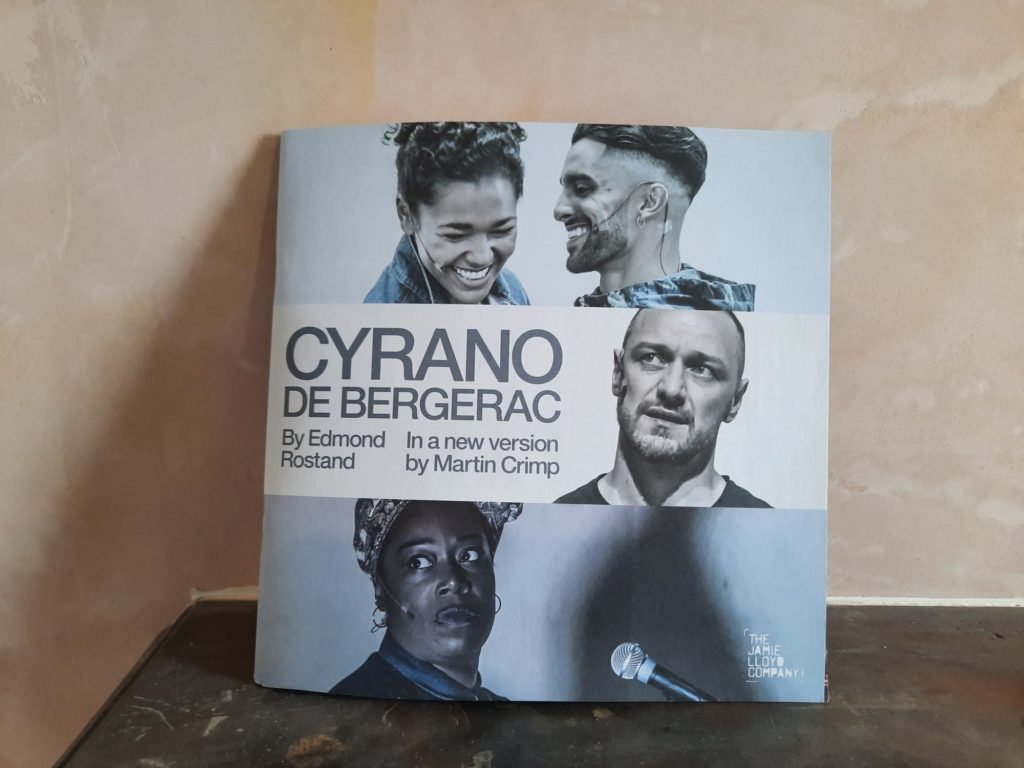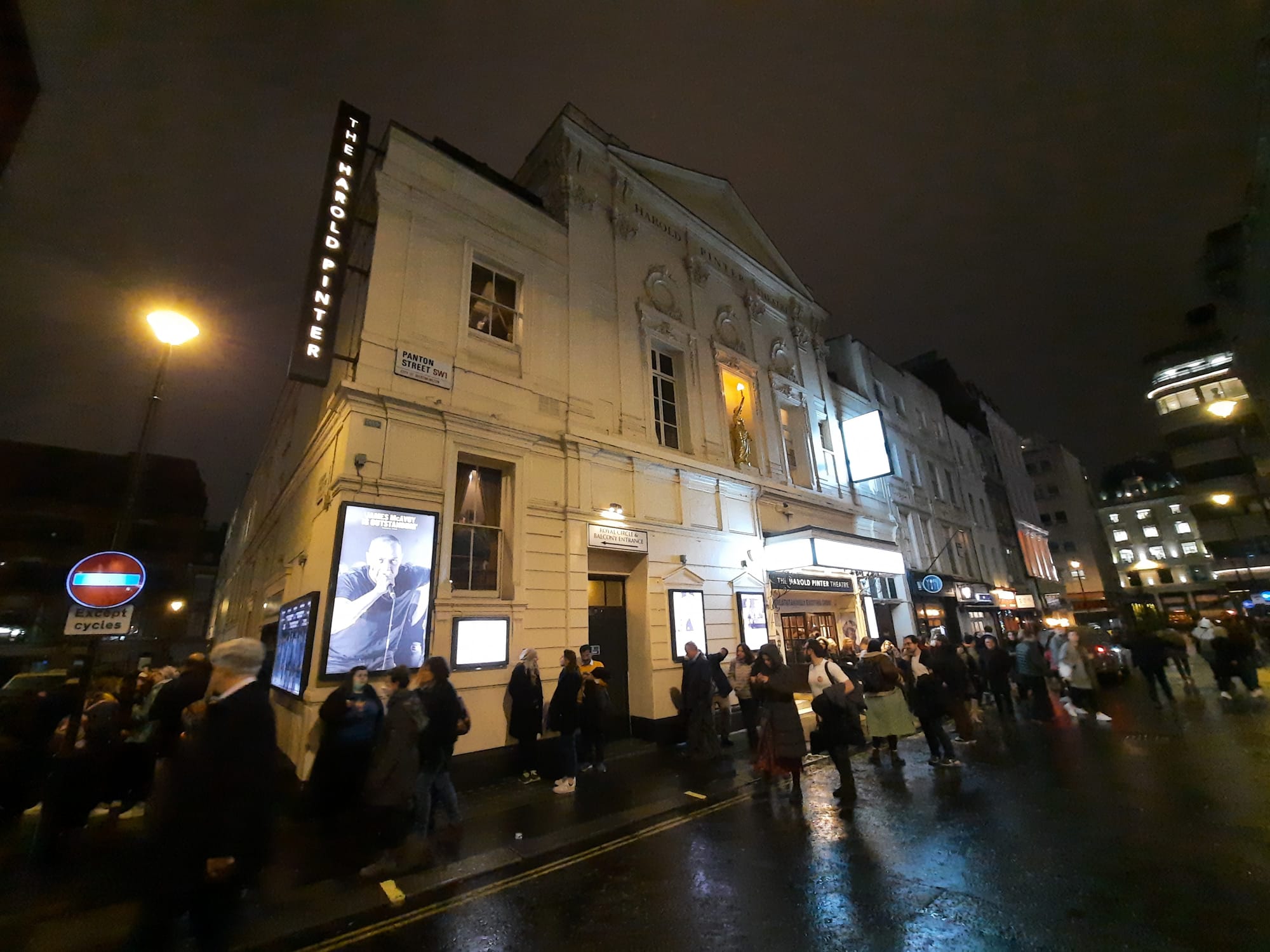Cyrano De Bergerac – Harold Pinter Theatre, London
A review of Cyrano de Bergerac at the Harold Pinter Theatre. This new version by Martin Crimp treads an interesting line between the classical and contemporary.

Cyrano de Bergerac, by Edmond Rostand
Cyrano de Bergerac is a relatively well known story. A witty poet, in love with his cousin Roxane, employs his way with words to woo her on behalf of another. He doesn’t believe she could ever love him because of his enormous nose. Unsurprisingly, a tale which begins with such deception and complex feelings doesn’t end all that well for the participants in the love triangle. You may have seen one of the many adaptations of the story, including the 1987 film Roxanne with Steve Martin. Or maybe you’ve seen the brand new film adaptation with Peter Dinklage.
What you may not be aware of is that Cyrano de Bergerac is a genuine historic figure. He lived from 1619-1655. Like the character Cyrano, he was a writer – in fact he wrote what might be the first work of science fiction, Comical History of the States and Empires of the Moon. He was also a soldier, fought many duels, and held the powerful to account. So far, so Cyrano. He even had a cousin named Madeleine (Roxane’s real name in the play).
What is less certain is the size of the real Cyrano de Bergerac’s nose. The flimsy ‘evidence’ behind the thesis that it was very large is that in his work about moon men he explains that, for them, a big nose is a sign of a brave, witty and generous nature. Surely qualities he would want to associate with himself? Not a lot to go on, but it didn’t stop 19th Century French writer Edmond Rostand. Rostand took genuine historic figures and details and added some artistic license, particularly in creating a love triangle between Cyrano, Roxane and the more conventionally handsome Christian. Cyrano de Bergerac struck a chord with audiences, made Rostand a celebrity, and has been translated and adapted countless times.
With an opportunity to see the latest adaptation in London before it heads to Glasgow and New York, let’s get stuck in and see what Martin Crimp’s new version has brought to this classic tale.
Cyrano de Bergerac, Translation/Adaptation by Martin Crimp
So this production, which debuted in 2019 and is now warming up again in the UK before a Broadway run, is by the Jamie Lloyd Company with a new adaptation by Martin Crimp. James McAvoy, a frequent Jamie Lloyd collaborator, is in the lead role. He is backed up by a talented cast including Eben Figueiredo as Christian (we last saw him at the Bridge Theatre in A Christmas Carol).
The brilliance of Martin Crimp’s adaptation (and Jamie Lloyd’s production) is how it blends the classic and the modern. He has updated the language – it’s sweary and funny. Yet it’s still a play in verse. The setting is 1640s France. Yet the costumes and set (by Soutra Gilmour) are contemporary. As is the replacement of physical duels with rap battles as a form of combat (fight movement by Kate Waters). This classic-contemporary dynamic is such an interesting tension. And has tempted new audiences to come and see it. Audiences who may not under other circumstances come to see a 17th Century-set, 19th Century play in verse. A lot of companies/theatres attempt to engage younger and more diverse audiences, but this production has actually done it – bravo.
One aspect of the direction which for me was a little mixed was the amount of ‘off-stage’ action. Characters often speak directly to the audience rather than facing each other. We are told that some key scenes are happening rather than seeing them. It keeps the staging clean. But in the second half this technique increased in frequency to the point where I didn’t feel the emotional connection I had in the first. Overall, however, I loved the bold choices and vision that accompany this new Cyrano de Bergerac.
A Heartbreaking Love Story
Let me tell you now without giving away too many plot points; if you want a happy version of this story, best to stick with Roxanne. This version doesn’t sugar coat anything, particularly the precarious position for women dependent on a man’s protection for survival. It also brings the love triangle truly to the fore. So often we find that an apparent love triangle is only a woman choosing between two men (more of a love angle than a triangle?). Crimp has resurfaced the additional tension inherent in the original. As James McAvoy said in a recent interview: “If I had to spend all my time loving a woman through a man who loved her and who loved him back, I would have to love him, too.”
So there is a lot for an actor to draw on. And as much as there are interesting parts here for a range of actors, McAvoy is undoubtedly the star of the show. There’s a scene near the end of the first half where Cyrano is speaking to Roxane, as Christian. It’s an amusing moment when he first puts on a South London accent. But it quickly becomes so powerful, so enthralling, so utterly heartbreaking that he has the audience in the palm of his hand. I’ve hardly ever experienced such utter silence from a packed house, people hardly breathing in order to catch every word. Absolutely wonderful.
And it’s because of this moment that I felt less excited about the second half and the emotional distance that I felt. I wanted to feel that vulnerability and excitement once more. This doesn’t take away from what I was saying about the overall production. Or from the other great performances, for instance Tom Edden as the acid-tongued villain De Guiche; Michele Austin as Ragueneau, lamenting the passing of an age. Or Nima Taleghani, whose turn as poet Ligniere shows us just how close classical poetry can be to contemporary spoken word and rap.
I highly recommend you catch this play if you can, before it heads off to Glasgow and Broadway. It’s hugely creative, exciting, funny and has a lot of heart, too.
Salterton Arts Review’s rating: 4/5
Cyrano de Bergerac on until 12 March 2022
If you see this after your page is loaded completely, leafletJS files are missing.

